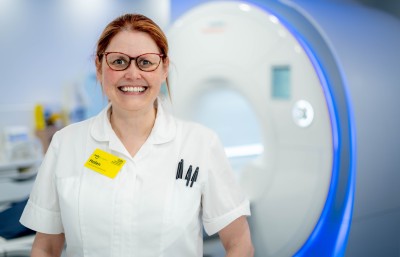
The radioactive chemical (sometimes called a radioisotope or isotope) emits gamma rays which are similar to X-rays. A tiny amount of chemical is put into the body, usually by an injection into a vein in an arm. (Sometimes it is swallowed, depending on the test). Over some time, it will concentrate on the area of interest. The radiation is detected by a gamma camera and converted into a computer image as the camera passes over you or rotates around your body.
There is one gamma camera at the Chesterfield Royal site opening times are 9am -3.45pm Monday to Friday.
Please read all the instructions in the appointment letter carefully. If you do not follow the instructions fully, we may not be able to carry out your test.
You can usually eat and drink as normal before your arrival and between your injection and scan. Your appointment letter will tell you if you have to do something different.
For most tests, there is no need to stop or change regular medicines. Your appointment letter will tell you if you need to stop or change medicines. If you normally have pain relief, please take this as normal; bring it along with you.
A tiny amount of chemical is put into the body, usually by an injection into a vein in an arm. (Sometimes it is swallowed, depending on the test). A technologist will tell you how long you have to wait for your scan; you may be able to leave the department and return later.
Will it hurt?
Only the ‘pinprick’ of the injection may hurt slightly. You may have had a blood test in the past - this is much the same.
You do not usually need to undress, although you may be asked to remove certain articles which could prevent us from getting a good picture, i.e., keys, coins belts, bras etc. You may also be asked to empty your bladder before the scanning begins.
Is there anything I should tell the staff before the injection and scan?
• If there is any chance that you could be pregnant
• If you are currently breastfeeding
• If you have had an x-ray procedure, which has used a contrast media (CT or MRI scan) within one week (eight weeks for radioiodine therapies) of your appointment
When it is time to do the scan, you will be asked to lie on a table and the gamma camera will pass over you or rotate around your body. This usually takes between half an hour to an hour. The camera will come close to you but not touch you and someone will be in the room with you at all times. The appointment letter will give you specific details for your test. You need to lie as still as possible whilst each picture is taken.
You may be asked to drink (non-alcoholic drinks) at least 1 litre of fluid during the day of the test. This helps wash the radioactivity out of your body. The rest will disappear naturally.
You may be asked to avoid close contact and prolonged contact with babies, children, and pregnant women for the rest of the day. This helps to avoid exposing them to any unnecessary radiation.